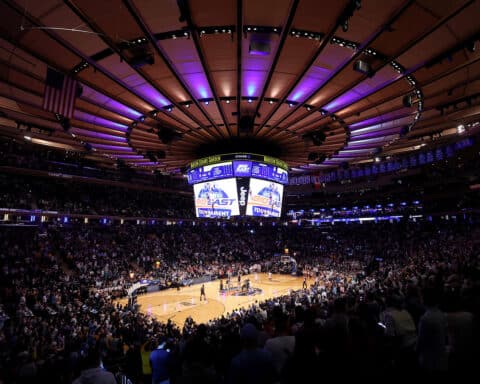Could there be a Catholic take on baseball?
If that sounds like a big question — and it is for sure that — maybe let’s ease into it by starting with a Catholic take on the labor vs. capital dispute that caused the recent lockout of Major League Baseball players by team owners. And let’s start with Catholic social teaching.
In his important and binding teaching in the encyclical Laborem Exercens, Pope St. John Paul II insisted that we “recall a principle that has always been taught by the Church: the principle of the priority of labor over capital.” According to Catholic teaching, labor “is always a primary efficient cause” and capital is “a mere instrument or instrumental cause.”
“This truth,” St. John Paul teaches, “must always be emphasized with reference to the question of the labor system and with regard to the whole socioeconomic system. We must emphasize and give prominence to the primacy of man in the production process, the primacy of man over things. Everything contained in the concept of capital in the strict sense is only a collection of things. Man, as the subject of work, and independently of the work that he does-man alone is a person. This truth has important and decisive consequences” (No. 12).
Or at least it should.
In the case of the lockout, those who had control over capital — that is, the entire means of production — locked out the laborers in an attempt to force them to renounce their rights and benefits in order to make the means of production more profitable for themselves. For instance, the player’s union (and Catholic social teaching, by the way, insists on a right to unionize) wanted to address two important facts. First, average player salaries had declined during three years that saw booming league revenues. Second, during the same time, it became clear that younger players had made so much dramatically less than older players — a key injustice, especially for players who get injured and have their careers artificially shortened.
In the end, after a 99-day lockout and public barbs from both sides, they reached a new collective bargaining agreement. Significantly, there were good wins from the perspective of Catholic social teaching, including an unprecedented 23% increase to the minimum salary for an MLB player.
So, can we all get behind the #baseballisback hashtag? No, not really. Because it just isn’t clear that the sport formally known as baseball is still going to be played this spring.
One thing that both sides actually agreed on was implementing the designated hitter in the National League. This change heralds the first time ever in the 146-year-history of Major League Baseball that every team’s pitchers will not be up at the plate hitting like every other position player.
In the owners’ interest, they’ll have more offensive production and home runs, while in the player’s interest, pitchers won’t have to bat and terrible fielders will still get contracts as DH’s on National League teams.
But what about the interest of the game itself?
In an effort to get my students to think about moral status, I sometimes ask them if “the game of baseball itself” can be harmed — apart from, say, what a majority of owners, players and fans may want at any given point in history. After this travesty of a rule change, I think that the answer to this question is more clear than ever.
Think about it. Why should the DH be limited to pitchers only? The batting average of a national league pitcher is about .137 or so. And yes — even when one factors in lower batting averages for all of baseball (the lowest since 1968!), the fact that MLB pitchers don’t get time in the cage and batting practice like they used to, and the fact that they often aren’t swinging to get on base — that’s a super low number.
But any idea what a starting catcher for the New York Yankees hit in 2020? .147! A very large number of NL pitchers hit better than he did. In fact, the average MLB catcher only hits about .240. Why not have a DH option for catchers? Wouldn’t there be similar benefits to defensive and offensive production? More home runs, extra-base hits and stolen bases from a second DH — plus fantastic stops and exciting pick-off plays from more excellent defensive catchers.
Heck, with this logic, why not have baseball essentially become football, where virtually all of the players serve in specialty roles? Wouldn’t that also improve the offensive and defensive outputs? And create a “better product” that could make more money in a consumer driven marketplace.
But a final point here about Catholic social teaching: Its insistence that not every good is appropriate for a consumerist marketplace looms large here. The good of baseball as a coherent sport has been threatened by a consumerist race to the bottom for some time, but now that the DH has proved victorious in both leagues, there is nothing stopping it from continuing to infect America’s pastime. The way it has been known and played over parts of three centuries has fundamentally changed.
MLB’s opening day is now April 7. Will the game being played still be baseball? Kind of. Maybe. But it is now clear that the seeds of its destruction — and replacement with a different kind of game — have begun to take firm root. Especially when watered and fertilized by the pressures of a consumerist marketplace.
Has this piece offered a comprehensively Catholic take on baseball here? Well, no. That would be a multi-volume book project. But it has argued that, looking at the sport through a Catholic lens, there are goods beyond what capitalism and a 50%-plus-one majority happen to push for at any given point in history that have direct and important implications for baseball. Indeed, this understanding of the good may be required for the game to persist as something other than a very different sport still erroneously referred to as “baseball.”
Charles Camosy is associate professor of theological and social ethics at Fordham University and author of “Resisting Throwaway Culture” (New City Press, $19.95).





